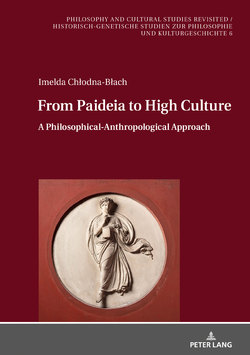From Paideia to High Culture

Реклама. ООО «ЛитРес», ИНН: 7719571260.
Оглавление
Imelda Chlodna-Blach. From Paideia to High Culture
From Paideia to High Culture. A Philosophical-Anthropological Approach
PHILOSOPHY AND CULTURAL STUDIES REVISITED / HISTORISCH GENETISCHE STUDIEN ZUR. PHILOSOPHIE UND KULTURGESCHICHTE
Отрывок из книги
Imelda Chłodna-Błach
Imelda Chłodna-Błach, PhD, is an assistant professor at the Chair of Philosophy of Culture and Rhetoric of the John Paul II Catholic University of Lublin (KUL). Her scientific interests focus upon philosophy of culture and civilization and philosophy of education. She teaches philosophy, rhetoric, and cultural studies.
.....
The following question should be asked: how did the sophists justify the possibility or even the necessity of education? First, by pointing to the necessary assumptions of the state and society (it was about, among other things, the civic education); second, they derived it from political and moral common sense. Protagoras proved that every man was trying to provide his children with possibly the most thorough education and that, in fact, everyone who did not even think about it, provided some education; third, they considered the problem in the context of the relationship between nature and art in general, in particular, the educative art. They pointed to its indispensable role in completing the existing nature. As they emphasized, on the one hand, it was necessary to know the human nature, on the other hand, however, it was important to have the knowledge on the proper methods of “cultivating” it. Moreover, they underlined that “the essential thing is to begin work at the right moment, the most educative moment, which in the human species is childhood, when nature is still pliable, and whatever is learnt is absorbed, easily but permanently, by the soul.’125
The essence of education perceived in this way was explained on the basis of land cultivation as a typical example of perfecting nature due to skilful human practices. Excellent yields can be expected only where the right conditions are met! Even the deficits of the poor nature can be removed at least partially when the suitable cultivation is applied in the form of education and exercise (and therefore the broadly understood culture). On the other hand, even the most beautifully equipped nature will fail if it lacks such cultivation. Aristotle pointed out that art compensated for the deficits of nature.
.....